Instead of elaborately programming a solution, neural networks and deep learning algorithms teach an image processing system to see, recognize and verify objects - in this case smoke.
 Automatic Forest Fire Detection System With AI Enables Early and Efficient Fire Fighting
Automatic Forest Fire Detection System With AI Enables Early and Efficient Fire Fighting

Article from | IDS Imaging
Heat waves caused by climate change are currently also increasing strongly across Europe and the associated risk of forest fires is rising immensely. Fires in natural areas are increasingly getting out of control due to drought or wind, and the risk of danger to people, animals, nature and infrastructure is growing. But how can fires be detected and localized at an early stage in order to minimize or even avoid serious damage? With image processing and artificial intelligence, even such challenges can be mastered. Instead of elaborately programming a solution, neural networks and deep learning algorithms teach an image processing system to see, recognize and verify objects - in this case smoke. Furthermore, AI enables a corresponding image processing system to draw conclusions from what it learns.
The French company Paratronic has taken up this issue. Within the scope of its field of activity of monitoring natural hazards, the solution provider has successfully devoted itself, among other things, to the development of an intelligent product for fire monitoring. The automatic forest fire detection system ADELIE (Alert Detection Localization of Forest Fires), whose key components are industrial image processing and artificial intelligence, has proven itself in practice. Four industrial cameras from IDS Imaging Development Systems GmbH are integrated into each system.
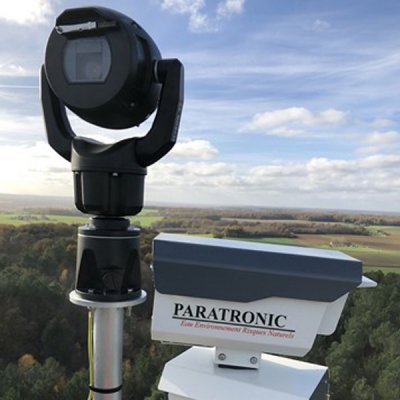
These permanently observe a specific forest area within a radius of up to 20 kilometers. Depending on the system, they need a maximum of two minutes to monitor a radius of 360 degrees. With the help of algorithms specially developed by Paratronic, the system is able to recognize and localize fire sources on the basis of the recorded images and to provide real-time information for appropriate options for action.
In this way, ADELIE ensures efficient planning and control of the fire brigade to protect our living space and, last but not least, to protect buildings, power lines, telecommunication lines, road or rail infrastructure.
Application
The ADELIE system is composed of at least two surveillance points that are networked together. Each surveillance point consists of two detection cameras and an additional camera that serves to eliminate doubts. Four Gigabit Ethernet cameras from IDS are integrated per ADELIE detection camera. Thus, a total of eight IDS cameras are used per surveillance point. These monitoring points allow 360° monitoring, with each azimuth visualized approximately every two minutes. Automatic monitoring of the observed natural area takes place around the clock, 24 hours a day, seven days a week.
The system is connected to a processing unit whose software contains artificial intelligence-based image processing algorithms. The programme developed by Paratronic registers, compares and analyses the images provided by the cameras. Long before a tree burns, smoke is released from the surrounding grass and scrub. By comparing the images and using taught-in features, the system detects the rising smoke. As soon as this smoke is visible from the monitoring point, ADELIE triggers an alarm. This phase is called automatic fire and forest fire detection. The operator on duty then controls the doubt-removal camera remotely and checks the type of detection. He locates the source of the fire on a map by means of triangulation and informs the control center, which initiates the fire-fighting measures.
At the same time, all information, images and knowledge gained by the AI are transmitted to the fire alarm center or the fire control center without delay. With the help of the real-time visualization of the event, the localization of the source of the fire on a digital map and various augmented reality functions, the context, extent and development of the fire can be immediately visualized there and appropriate fire-fighting measures can be taken. A remote-controlled video camera completes this system. This is used to verify and monitor the fire until the first fire-fighting unit arrives and enables the fire to be tracked from the outbreak until it is extinguished.
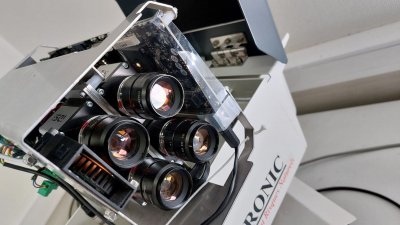
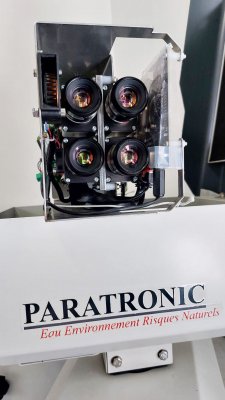
"The IDS cameras play an important role in the operation of the ADELIE system. They have the task of continuously filming the forest azimuth by azimuth and providing the software with these images in real time," underlines Edouard BOUILLOT, Director Projects and Innovation at Paratronic. When choosing the appropriate model for the automatic forest fire detection system, the decision was made in favor of a Gigabit Ethernet camera from the SE series from IDS. "Our system uses the UI-5240SE-NIR-GL model," explains Loïs Carrié, Paratronic engineer. This particularly powerful industrial camera is equipped with a 1.3 megapixel CMOS sensor from e2v. The highly sensitive sensor is used by Paratronic in the NIR version (EV76C661ABT). In addition to its outstanding light sensitivity, the sensor offers two global and rolling shutter variants that can be switched during operation. This allows maximum flexibility for changing requirements and environmental conditions, as in this case caused by different times of day and weather conditions. In addition, four areas of interest are available. This allows either several features to be checked at the same time or the AOIs to be captured in an exposure series with different parameters.
The camera thus meets all requirements, confirms Lois Carrie. "We chose this model for three main reasons. Firstly, it convinces with its spectral sensitivity. The sensor picks up all visible color wavelengths, with particularly good sensitivity in the near-infrared. We also need the option of screwing a wavelength filter into the C-mount close to the sensor. Thirdly, the camera offers the direct possibility of sequentially taking four pictures with increasing exposure time. Continuous shooting makes it possible to get a very high dynamic range."
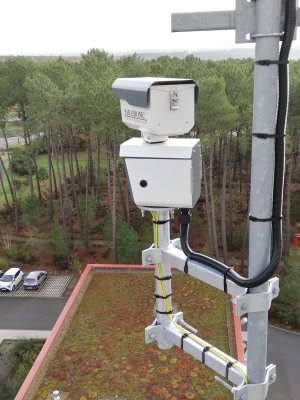
Software
For image acquisition, the system uses the uEye SDK, "Then our own image processing system comes into play," explains Edouard BOUILLOT. The ADELIE software then does the image analysis to detect the presence of smoke on the canopy. The analysis is done by comparing two images taken in the same orientation to detect any smoke. This is made possible by several exclusive algorithms developed by PARATRONIC that allow the comparison of a very large number of factors that are not visible to the naked eye.
This analysis is carried out in three phases. In phase one, the images to be compared are registered to the nearest 50th of a degree. In phase two, the images are compared to highlight any changes, such as the movement or displacement of objects or the appearance of smoke. In the third stage, advanced analysis takes place, based on the use of different algorithms: The highlighted differences are not only examined in terms of their shape, size, distance, etc., in order to eliminate all elements other than smoke as best as possible. Other algorithms using automatic classifiers and working with parameters extracted from one or more images complete this analysis.
The data is then transmitted to the computer control system via a digital network such as fiber optics. The respective data sets contain both a JPEG file of the image for display on the screen, as well as a file containing the camera number, the angle of view, the date and time of the shot, the azimuth. By integrating a weather station, meteorological data such as wind strength or precipitation can also be recorded and taken into account.
If an image and its linked file report a fire, an automatic check is carried out: the system makes an estimate of the location of the smoke, then cross-checks it against known locations where other types of smokes appear. This ensures that an alarm is only triggered if this detection has not taken place in an exclusion zone, i.e. a zone where permanent smoke is known to exist, such as a factory chimney.
If only one tower has detected the smoke, the distance indicated in the telemetry is used. If at least two towers have detected it, the exact location of the source of the fire in the control center is determined by triangulation.
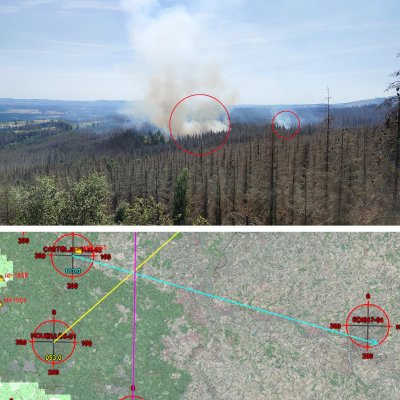
As with any automatic system, human validation of the alarms transmitted is essential with ADELIE. The staff at the control center use a high-resolution camera with a powerful optical zoom (30x, with a wide-angle lens) to confirm whether it is indeed a fire outbreak. The persons responsible for surveillance can observe the situation from a distance without interrupting the detection system thanks to these cameras, the so-called doubt removal cameras. The ADELIE detection system thus remains fully active in order to be prepared even if several fires occur.
The system is extremely powerful. For each site, 13500 images are taken, transmitted and stored for 30 days within 24 hours, regardless of whether they contain a detection or not. In addition to these captured images, the system also stores the videos from the camera that were used to observe and validate the incident, thus enabling comprehensive documentation. Based on all the data collected, ADELIE can generate statistics on the basis of which emergency services can align and optimize their measures. "With the help of the stored images, we can analyses the course of the fire and the firefighting afterwards. The amount of data grows continuously with each event that feeds the database. This in turn increases the reliability of the statistics needed for the continuous improvement of prevention and control measures," sums up Edouard Bouillot.
The system is successfully used in the Sarthe department, the most densely forested department in the north-western quarter of France. Forest fires are increasingly a reality there, especially in the spring and summer months. For several years now, there have been more and more fires in natural habitats. After numerous forest fires in 2019, a total of 117,000 hectares of forest were equipped with a network of automatic fire detection systems at the beginning of 2021. A total of 48 cameras now monitor the forests above the treetops at twelve points distributed across the department near particularly endangered areas.
“The ADELIE System allowed us to improve the detection time as well as the precision of the fire location,” says Christophe Burbaud, Comptroller General at the Sarthe Fire Department (SDIS72).
Advantages
- Continuous monitoring of forest fires: all year round, on the whole or part of the territory, day and night.
- Time saving: real-time visualization of the disaster, immediate transmission of alarms, precise localization of the source of the fire thanks to a triangulation system. Thanks to the cameras and especially the doubt-removal camera, verification and confirmation is much faster than an emergency call.
- Elimination of human risks: no more isolated men on watch towers.
- Long-term monitoring: data storage enables continuous improvement of forest fire monitoring and detection.
ADELIE is thus more than an automatic fire and forest fire detection system, but an integrated fire and forest fire monitoring and information management system. The French image processing solution thus makes a decisive contribution to damage limitation. Through early fire detection and precise localization of fire outbreaks, it significantly reduces the risk of spread and can minimize associated damage to people, the environment and the national economy.
The content & opinions in this article are the author’s and do not necessarily represent the views of AgriTechTomorrow
Comments (0)
This post does not have any comments. Be the first to leave a comment below.
Featured Product

